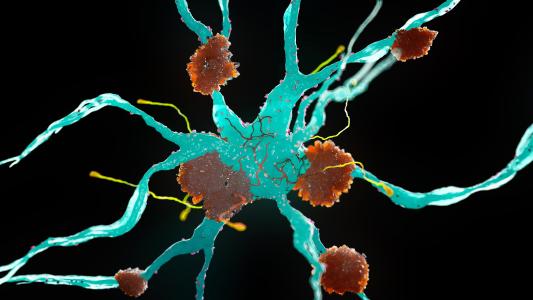A new stroke treatment could give doctors a way to help victims before the stroke causes permanent brain damage.
This therapy could be administered before imaging tests reveal the type of stroke — and that saved time could dramatically improve patients’ chances of a full recovery.
“Time is brain”: Strokes occur when the supply of blood to the brain is interrupted, but they can have diametrically opposite causes: clots or bleeds. Strokes are usually caused by a clot in an artery (called an ischemic stroke), but sometimes by a ruptured blood vessel (hemorrhagic stroke).
If the brain doesn’t receive a steady supply of blood, cells within it start to die. The longer the brain goes without blood, the more opportunity for lasting brain damage, so it’s important that stroke victims receive prompt treatment.
“Unquestionably, the longer therapy is delayed, the lesser the chance that it will be successful,” neurologist Camilo R. Gomez wrote in an oft-cited editorial in 1993. “Simply stated: time is brain!”
The challenge: There’s only one drug-based stroke treatment for clots, which uses blood thinners to break up clots in arteries, and it must be administered within 4.5 hours of the stroke to be as effective as possible.
The problem is that blood thinners are the last thing you want to give someone with a bleed — and doctors can’t tell if a patient’s stroke was caused by a clot or a bleed without performing an MRI, and those take time.
Now, researchers from China’s Capital Medical University and Fourth Military Medical University have developed a new stroke treatment that appears to prevent brain cell death after both types of strokes, meaning doctors could administer it safely without having to wait for MRI results.
A new stroke treatment: For their study, the researchers started by showing that certain brain cells begin overproducing a protein called MD2 after both types of strokes.
This protein essentially triggers brain cells to commit suicide, mulitplying brain damage after strokes.
The longer therapy is delayed, the lesser the chance that it will be successful.
Camilo R. Gomez
The researchers then designed a type of compound called a peptide to disrupt the MD2 protein, protecting neurons from its deadly effects.
The results: The peptide therapy prevented neuron death in both rodent and nonhuman primate models of both types of strokes. It was also effective even when administered up to 6 hours after an event.
The stroke treatment appears safe, too — it showed no signs of toxicity when administered to mice in high doses.
Looking ahead: More animal studies are needed before the stroke treatment can be tested in humans. Those studies will need to include older animals, as well as females — so far, all of the testing has been done on males.
However, if the peptide therapy proves as effective in people as in animals, it could allow doctors to treat stroke victims immediately, improving patients’ chances of a full recovery.
We’d love to hear from you! If you have a comment about this article or if you have a tip for a future Freethink story, please email us at [email protected].






